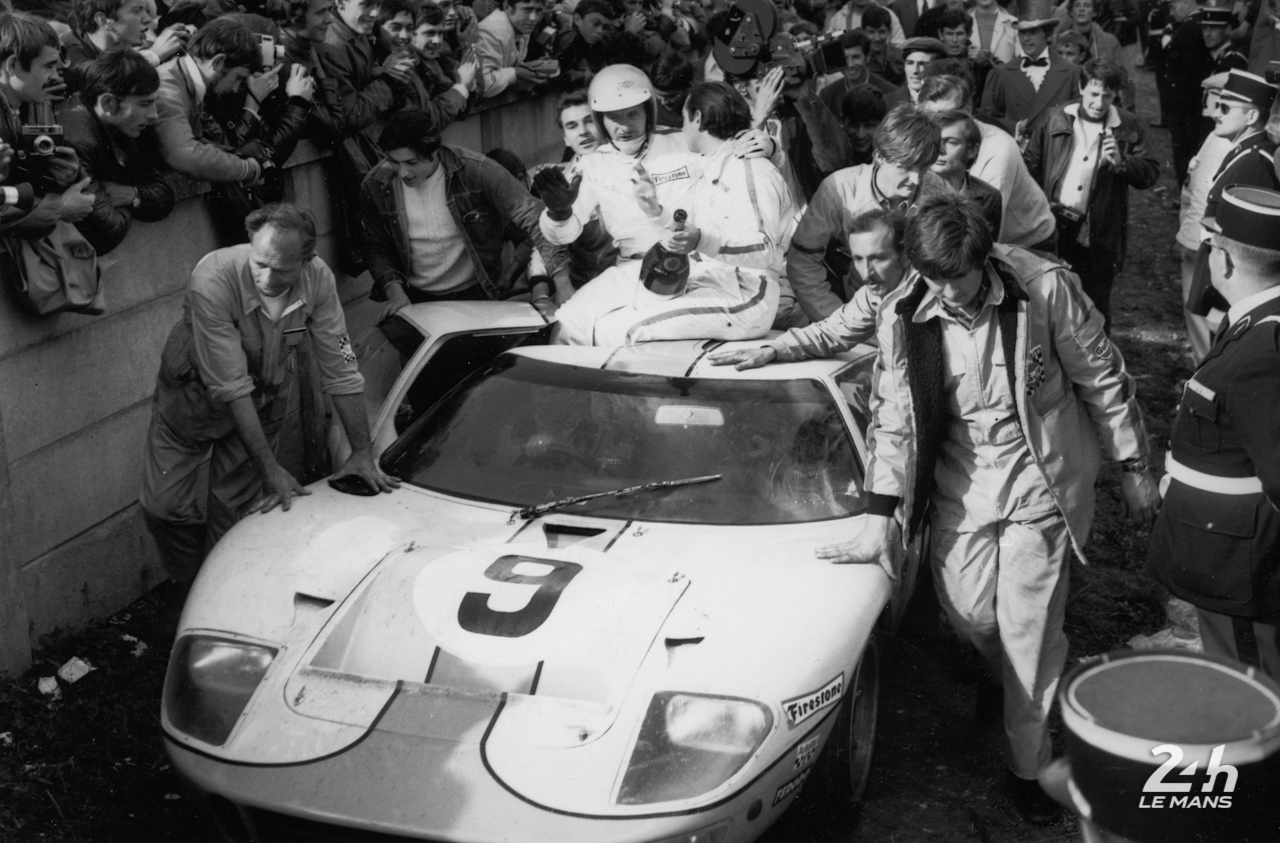Ford owes its victories at the 24 Hours to two legendary team owners: the American Carroll Shelby and the Brit John Wyer. And from 1966 to 1969, one very special guitarist made his mark on the history of rock and roll in both the U.S. and Great Britain: Jimi Hendrix.
Ford, four wins between the U.S. and Great Britain – Carroll Shelby and John Wyer had already made a name for themselves at the 24 Hours even before Ford's big Le Mans offensive. In 1959, for Aston Martin's sole overall victory at the race, Shelby was at the wheel (along with British driver Roy Salvadori) and Wyer was the team manager. The triumph is depicted in the dreamlike night sequence that opens the film Le Mans '66 (Ford v Ferrari). After becoming a team owner, Shelby gave Ford its first two wins in 1966 (Chris Amon-Bruce McLaren) and 1967 (A.J. Foyt-Dan Gurney). That latter year, Wyer founded JWA Engineering and secured the sponsorship of Gulf Oil. In 1968, the CSI (Commission Sportive Internationale, predecessor to the current FIA) limited prototypes to 3-liters, but also created a Sport class for cars up to 5-liters. Wyer took advantage of the new regulations with the Ford GT40 and clinched two additional victories for the American marque. That year, the socio-political unrest in France pushed the 24 Hours from June to the end of September, making it the final round of the World Marques Championship...won by Ford thanks to the win of Lucien Bianchi and Pedro Rodríguez. In 1969, Jacky Ickx, along with Jackie Oliver, claimed the top step on the podium in the last lap after starting dead last for walking to his car in protest of the dangerous Le Mans start.
PHOTOS (Copyright - ACO/ARCHIVES): LE MANS (SARTHE, FRANCE), CIRCUIT DES 24 HEURES, 24 HOURS OF LE MANS 1966 & 1967. After the second win in a row for Carroll Shelby's outfit in 1967 with the Mk IV of A.J. Foyt and Dan Gurney (above), John Wyer and his JWA Engineering team took up the torch in 1968 (below): Lucien Bianchi (helmeted) and Pedro Rodríguez (holding a bottle of Champagne) won the 24 Hours with the GT40, earning Ford a world title.
Jimi Hendrix, an Anglo-American transmigration – Born in Seattle on 27 November 1942, Jimi Hendrix was discovered in New York by band manager Chas Chandler, formerly the bassist for the Animals, who took him to London in 1966. Understandably, his guitar playing and stage performances stupefied most British music stars of the day, including Eric Clapton, George Harrison and Paul McCartney. In 1967, the year Ford surpassed the 5,000 km mark at the 24 Hours of Le Mans, Hendrix's first two albums, Are You Experienced and Axis: Bold As Love, revolutionized the electric guitar. That year, still virtually unknown in the U.S., he made his big debut at the Monterey Pop Festival in California. In 1968, he expanded his sound by exploring all available recording means for the double album Electric Ladyland. The research culminated in his own recording studio in New York, called Electric Lady Studios, with the goal of creating a technical environment suited to his needs. On 18 August 1969, on the fourth and final day of Woodstock, Hendrix cemented his place in music history with his version of the American national anthem, forever redefining the sound of the electric guitar. "He changed my perception with the way he constructed a song around a guitar riff," said Deep Purple guitarist Ritchie Blackmore in 1984. Nearly half a century after his death on 18 September 1970, Jimi Hendrix's legend continues to endure.


